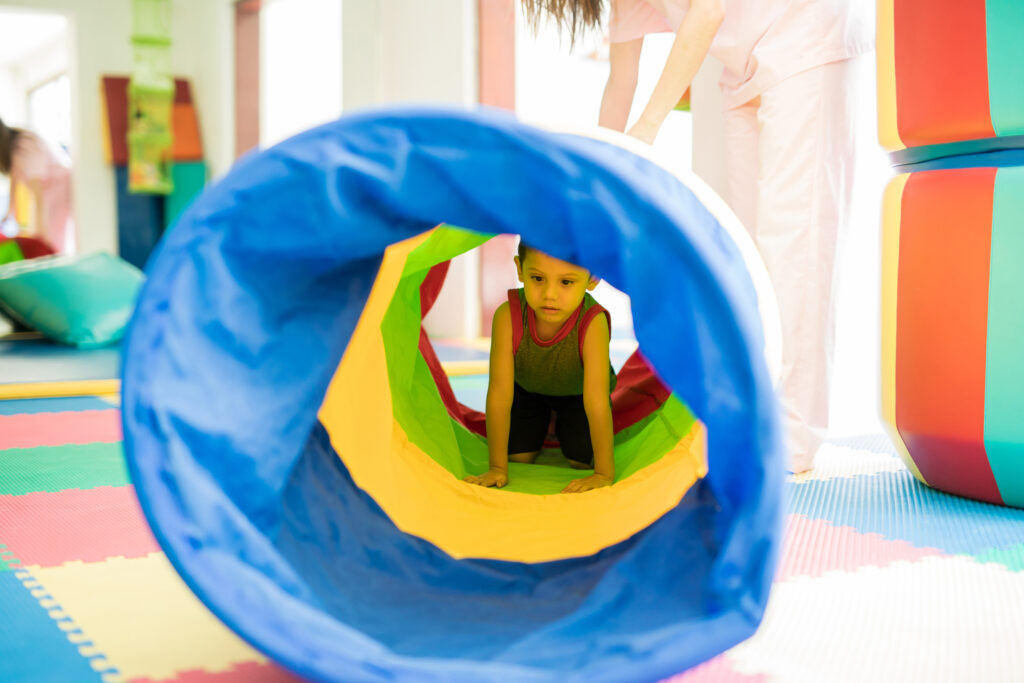Play with a Purpose: Pediatric Rehab Turns Fun into Function

For children, play isn’t just about having fun, it’s done with a purpose. Play is how they learn, grow, and develop essential skills. Pediatric rehabilitation specialists understand this well, using play-based therapy to help kids build strength, coordination, communication, and independence. Whether a child is recovering from an injury, managing a developmental delay, or strengthening motor skills, play-based rehabilitation ensures therapy is engaging, effective, and enjoyable.
The Power of Playing with a purpose
Traditional therapy can feel daunting for children, but incorporating play into rehabilitation makes it more natural and enjoyable. Through guided activities tailored to each child’s needs, therapists transform therapy sessions into exciting experiences that foster progress. Here’s how play-based therapy benefits children:
1. Enhances Motor Skills
Activities like crawling through tunnels, balancing on beams, or playing with therapy balls strengthen gross motor skills, coordination, and balance. Fine motor skills improve through activities like stacking blocks, using play-doh, or engaging in arts and crafts.
2. Encourages Cognitive and Sensory Development
Sensory play, such as engaging with different textures, playing with water, or using light and sound toys, helps children process sensory information, improve focus, and regulate emotions. Cognitive skills, including problem-solving and memory, are reinforced through games and puzzles.
3. Boosts Communication and Social Interaction
Play therapy helps children develop language and communication skills by encouraging interaction. Activities like role-playing, storytelling, or playing with peers support expressive and receptive language development.
4. Builds Strength and Endurance
For children with physical challenges, fun activities like obstacle courses, climbing, or jumping help build muscle strength and endurance while making exercise feel like play rather than work.
5. Increases Confidence and Independence
By making therapy enjoyable, children are more willing to participate and push past their perceived limits. When they see progress, whether it’s tying their shoes, throwing a ball, or completing a puzzle, they gain confidence in their abilities.
Play-Based Activities Used in Pediatric Rehabilitation
Therapists use a variety of play activities tailored to each child’s needs. Some examples include:
- Obstacle Courses: Enhances strength, coordination, and problem-solving.
- Swing Therapy: Helps with balance, sensory processing, and vestibular development.
- Sensory Bins: Supports tactile processing and fine motor development.
- Board Games and Puzzles: Encourages cognitive development and social skills.
- Music and Dance: Improves coordination, rhythm, and self-expression.
- Water Play: Strengthens muscles and improves range of motion in a low-impact way.
How Parents Can Support Play with a purpose at Home
Therapy doesn’t have to stop at the clinic. Parents can integrate play-based strategies into daily routines to reinforce progress:
- Encourage movement games like Simon Says or obstacle courses at home.
- Use arts and crafts to strengthen fine motor skills and creativity.
- Engage in storytelling and role-playing to boost communication skills.
- Create DIY sensory bins with rice, beans, or kinetic sand to stimulate sensory development.
Pediatric rehabilitation doesn’t have to feel like hard work. It can be filled with laughter, fun, and engaging activities that make a real difference in a child’s development. By turning therapy into play, children not only build essential skills but also gain confidence, independence, and a love for movement and learning. Whether at home or in therapy, play truly has a purpose!
